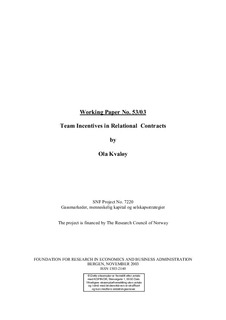Team incentives in relational contracts
Working paper

View/
Date
2003-11Metadata
Show full item recordCollections
- Working papers (SNF) [809]
Abstract
Incentive schemes for teams are compared. I ask: under which conditions are relational incentive contracts based on joint performance evaluation, relative performance evaluation and independent performance evaluation self-enforceable. The framework of Che and Yoo (2001) on team incentives is combined with the framework of Baker, Gibbons and Murphy (2002) on relational contracts. In a repeated game between one principal and two agents, I find that incentives based on relative or independent performance are expected to dominate when the productivity of effort is high, while joint performance evaluation dominates when productivity is low. Incentives based on independent performance are more probable if the agents own critical assets.
Publisher
SNFSeries
Working paper2003:53